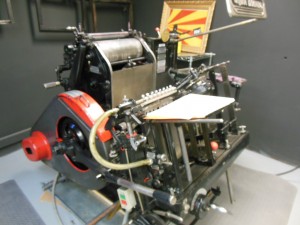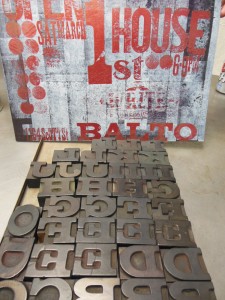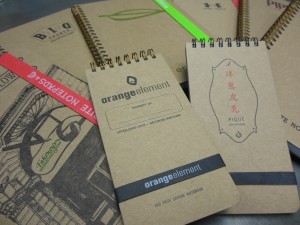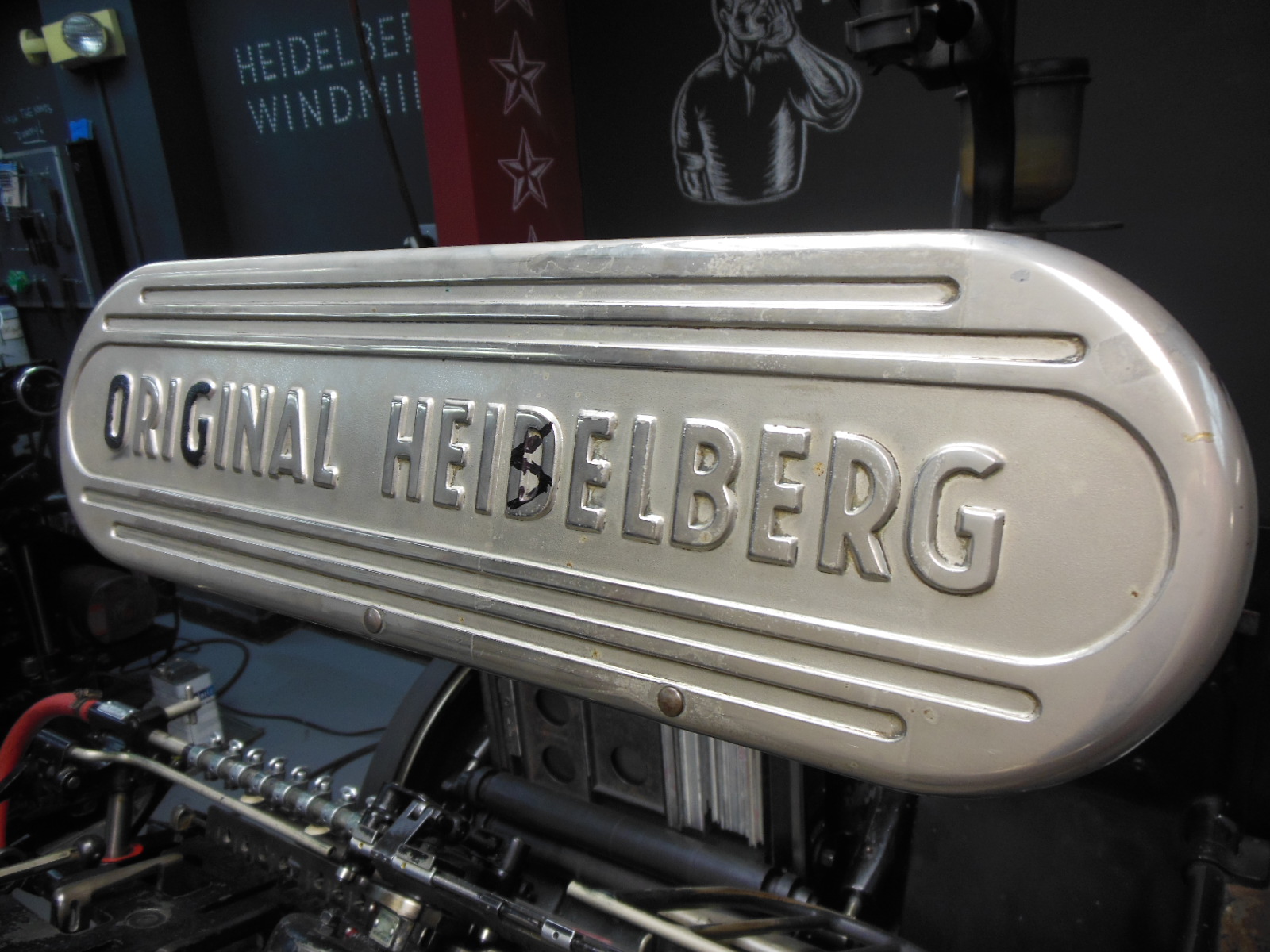Write Notepads & Co.: Binding ties to Baltimore
There is nothing about the old Allied Binding Company building on Wicomico Street, which would suggest that time travel is taking place inside. But step through the doors, survey the antique machinery, then spend a few minutes with Write Notepads & Co. co-owner Chris Rothe, and you start to feel like you’re about to spend a night in a very busy museum.
The Baltimore Post-Examiner caught up with Rothe for a behind the scenes look at his charming enterprise during a break at the recent Diorama-Rama.
“My grandfather founded Allied Binding. There was nothing profitable for a very long time and when things finally did get good – he perished from a heart attack. So my father and his brother, who were both pretty young at the time, took over the business. My brother Marc and I are the next generation. Growing up in the business, we’ve run the whole gamut with this.

“In 2011, I decided it was time to take an idea and turn it into something else. We have this great thing at Allied where we provide a business-to-business service to commercial printers. But I thought, ‘This is not what I want to do for the rest of my life’. I could either leave the family business, which is very difficult to do, or I could do something within the family business that sorta creates an entirely different dynamic. So, enter Write Notepads & Co. We create a product that’s done our way, and it really showcases our personality.”
When Rothe says the notepads are done “our way” he is mainly speaking of his vision for the business, which manufactures notebooks and notepads with a distinctly nostalgic feel. But “our way” also incorporates the imagination and ingenuity of several bygone generations.
“We really enjoy using what a lot of people in commercial work would just consider to be dead equipment. We’ve resurrected them into their former glory.”
Three Heidelberg Windmill presses, the oldest of which dates from the 1950’s, form the backbone of the operation. Rothe described them as rock solid, reliable machinery.

“These suckers can crank out several thousand pieces an hour. That’s nothing compared to today’s offset print which can rip off tens of thousands of pieces an hour in multiple colors, but I think it’s taken some of the charm out of what traditional print is. A vast majority of the book covers we create are printed on these presses. For others, we have a 1920’s vintage Vandercook No 1.”
Rothe is particularly proud of the Vandercook press.
“It’s a fully manual hand-cranked press. And whatever we put in – whether we’re locking up wood type or a cut or any sort of a graphic – it must be hand brayed (inked) as well. This is the machine we use when we really want to get down and dirty creative.”
“All of the hand carved wood type we use was made in the 1850’s by Page & Co., and came from a shop called Wilkes-Barre Printing. That’s the same place two of our Heidelbergs came from. The father had passed away and the sons didn’t want to take over the business. We acquired 12-15 different wood typefaces. That’s tiny when compared to what Globe Poster had, but it’s fun to experiment with. It’s also great for showing people how letter press is done. We had the Jemicy School art class here last fall, and they got a chance to make their own book covers.”
The machinery is cool, but Roth says that is just part of what makes Write Notepads & Co. unique. Another aspect is the team of material suppliers.
“We do everything here from nuts to bolts, and everything we use is American sourced. What’s really fun about the board stock we use is it’s made by Newman Paper Board in Philadelphia and it’s all 100% post-consumer waste. I’ll print a book and pull it out, because I think I see an imperfection in the board stock, and what I find is readable print from a recycled newspaper.

“The paper stock is a 70 lbs product which is lined with an old school process called pen ruling. W.G. Fry out of Massachusetts is our supplier for the stock. They’re a company that’s been around for a long time. You look around at their place and see American ingenuity.
“The term pen ruling might bring to mind a workshop full of people using rulers and reams of Bic pens. Basically what that comprises are series of brass wheels set with 1/4 inch lead spacers on a long steel shaft. The wheels are inked in two ink pots, so the stock is inked both top and bottom in one pass. It’s inked and sheeted in one pass, so you have this continuous motion, kind of like a pendulum. That’s another traditional method which was employed before onset of commercial offset printing. We coined the term Brass Ruled Paper, which I think is a little more romantic and more accurately describes the process.
“As I said, everything is made here in the Untied States. Even our wire manufacture (Spiral Binding in Totowa, New Jersey) and our rubber band maker (Alliance Rubber of Hot Springs, Arkansas) are American companies. And funny enough, a lot of them are small, family owned businesses. We all just sorta work together.”
Rothe points out that a lot of hand work goes into the final product.
“Regardless of how much machinery has advanced since the days of Wittenberg, there are still things which are best done by hand. When you put it all together, you get what you would have gotten over 100 years ago. We wanted to tie everything together and produce a nice, nostalgic product.”
Nostalgia sells, but so does the hardy heft of the finished product. Last year, Write Notepads’ antique presses produced more than 10,000 high quality notebooks.
“We just did a huge order for Under Armour. Ravens coach John Harbaugh is another one of our customers. He orders a bunch of them before every season. He is very diligent about taking notes and archiving his thoughts. We even have a customer in London! He wanted some of our notebooks and is pretty pleased with the product. We’re pretty pleased, too.”
Cheap imports may be the mantra for big corporations today, but Rothe prefers the quality – and the closeness – of a state-side family business.

“We have 10 employees. It’s a tight knit family here,” said Rothe, who is quick to credit his fore-bearers (his grandparents – who met at Pearl Harbor in 1941 just before the Japanese attack; and his father Tom and uncle Rick) for creating and maintaining the Allied Binding Company.
“We’re very, very fortunate with our employees in that we have zero turnover. We have people who have been here for twenty or more years. And they’re well versed in everything that they do. It’s really fascinating to watch, when we’re humming out there, how they can jump from one task to another. They know everything inside and out. We try to take care of our employees, and we also try to take care of our community.”
Rothe’s way of taking care of the community is through in-kind donations made possible by his notebook customers.
“Through a number of friends who are teachers, I realized there was a need to provide notebooks to area school children. I really like the Tom’s Shoes model, where if you buy a pair, they donate a pair. But I wanted to make sure we weren’t leaving people wondering where their donation was going. So we put a 5-digit code number on each of our notebooks which corresponds to a local school. Basically, people can go on our website, enter the code and it takes them to the website of that particular school. In a sense, it brings things full circle, because people can look at the school and say, ‘Hey, they could use something else; maybe school uniforms or band instruments’. The notepad donations open other possibilities.”
Such as teaching children about the value of holding onto a dream. Even if that dream depends on museum piece technology.
“You know, I can run 1,000 covers thru a machine one day – all perfect – then come in the next day and nothing goes right.”
“Some days you get it. Some days, it gets you.”
More information about Write Notepads & Co. may be found online at Write Pads. Retail outlets in the greater Baltimore/Washington area which carry Write Notepads include ~ Trove Home & Gifts in Hampden; Su Casa in Fells Point; Farney’s Pens in DC; and Pippi’s Pen Shoppe in York, Pennsylvania.

Anthony C. Hayes is an actor, author, raconteur, rapscallion and bon vivant. A one-time newsboy for the Evening Sun and professional presence at the Washington Herald, Tony’s poetry, photography, humor, and prose have also been featured in Smile, Hon, You’re in Baltimore!, Destination Maryland, Magic Octopus Magazine, Los Angeles Post-Examiner, Voice of Baltimore, SmartCEO, Alvarez Fiction, and Tales of Blood and Roses. If you notice that his work has been purloined, please let him know. As the Good Book says, “Thou shalt not steal.”

